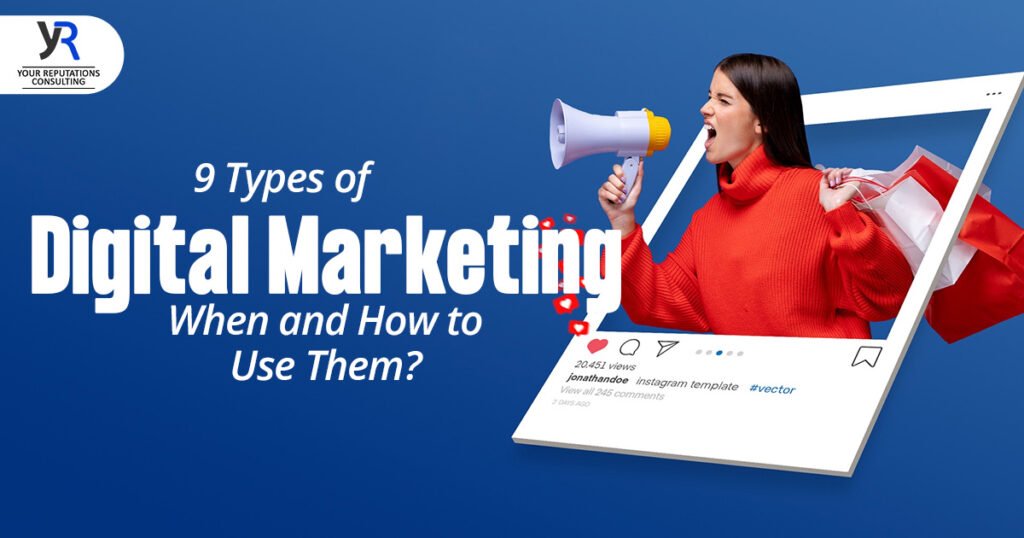9 Types of Digital Marketing: When and How to Use Them?

9Types of Digital Marketing: When and How to Use Them?
Businesses in the modern digital world must make efficient use of digital marketing to reach their target audiences. Digital marketing refers to a broad range of tactics and distribution platforms that let companies advertise their goods and services online.
Improve your abilities to gain access to new opportunities. With the help of Your Reputations Consulting’s best digital marketing courses, you can speed up your digital marketer journey.
What is digital marketing?
Digital marketing refers to the use of digital channels, such as search engines, social media platforms, websites, email, and mobile applications, to promote products, services, or brands. It involves various online marketing tactics aimed at increasing brand visibility, driving website traffic, generating leads, and ultimately achieving business goals.
9Types of Digital Marketing: When and How to Use Them?
- Search Engine Optimization (SEO): Increase organic visibility in search engine results by optimizing your website’s content and structure. Ideal for long-term sustainable traffic growth.
Pros:
- Organic
- Long-term visibility
- Increased website traffic
- Enhanced credibility
Cons:
- Requires ongoing effort and time for optimal results
- Constantly changing algorithms
- Pay-Per-Click Advertising (PPC): Place targeted ads on search engines or other websites and pay only when users click on them. Effective for immediate visibility and driving targeted traffic.
Pros:
- Immediate visibility and results
- Targeted reach
- Control over ad spend.
Cons:
- Can be costly
- Requires ongoing management and optimization.
- Social Media Marketing: Engage and interact with your audience on popular social media platforms like Facebook, Instagram, Twitter, and LinkedIn. Build brand awareness, drive website traffic, and foster customer loyalty.
Pros:
- Wide audience reach
- Targeted advertising
- High engagement potential.
Cons:
- Constant algorithm changes
- Time-consuming content creation.
- Content Marketing: Create and distribute valuable and relevant content, such as blog posts, videos, and infographics, to attract and retain a clearly defined audience. Establish thought leadership and build trust.
Pros:
- Establishes thought leadership
- Improves brand reputation
- Boosts SEO.
Cons:
- Requires consistent content creation and distribution;
- time-intensive.
- Email Marketing: Utilize targeted email campaigns to nurture leads, retain customers, and promote products or services. Effective for personalized communication and driving conversions.
Pros:
- Direct communication with customers
- Personalized messaging
- High conversion rates.
Cons:
- Risk of being marked as spam;
- Maintaining a quality email list is crucial.
- Influencer Marketing: Collaborate with influential individuals on social media to promote your brand or products to their engaged audience. Ideal for reaching specific target demographics and building credibility.
Pros:
- Builds trust and credibility
- Reaches niche audiences
- Authentic endorsements.
Cons:
- Finding the right influencers;
- Potential for dishonest endorsements.
- Affiliate Marketing: Partner with affiliates who promote your products or services and earn a commission for each sale or lead they generate. The cost-effective way to expand your reach and drive sales.
Pros:
- Cost-effective;
- Performance-based payment;
- Wider reach through affiliates.
Cons:
- Requires careful affiliate selection;
- Potential for fraudulent activities.
- Video Marketing: Utilize engaging videos to showcase your products, share informative content, or tell compelling stories. Effective for capturing attention and increasing engagement.
Pros:
- Engaging and shareable content;
- Higher conversion rates;
- Improved SEO.
Cons:
- Requires quality production;
- May require additional resources.
- Mobile Marketing: Optimize your marketing efforts for mobile devices, including mobile-responsive websites, mobile apps, and targeted mobile ads. Reach users on the go and leverage location-based targeting.
Pros:
- Reaches a mobile-centric audience;
- Personalized messaging;
- Location-based targeting.
Cons:
- Varied device capabilities;
- Smaller screen sizes may limit content.
In conclusion, businesses need marketing strategies to effectively promote their goods and services, connect with their target market, and accomplish their objectives. A career in digital marketing offers a multitude of alternatives, Your Reputations Consulting, one of the top leading digital marketing company, will help you develop as a successful digital marketer with our best digital marketing training program, that will enable you to flourish in the highly competitive landscape of digital world.